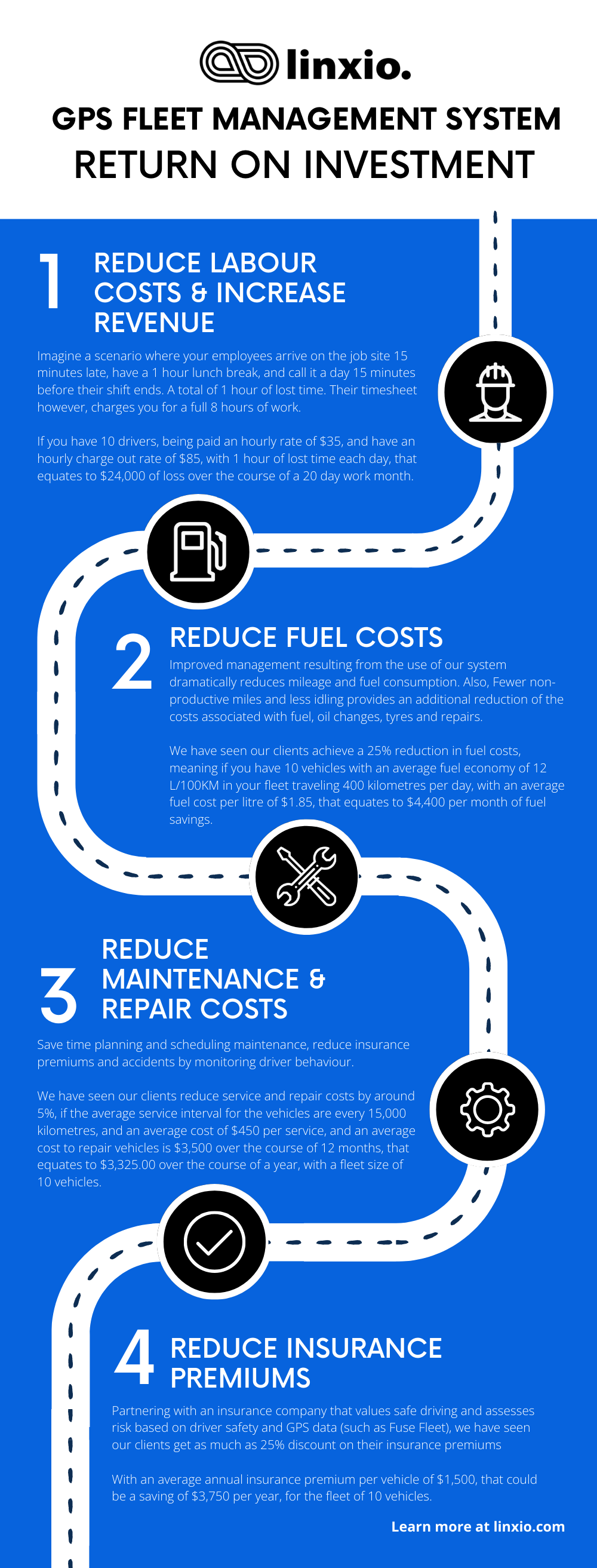In today’s competitive business landscape, maximizing return on investment (ROI) is essential for long-term success. One area that has proven to significantly enhance ROI for companies with fleets is the adoption of GPS fleet management systems.
In this comprehensive guide, we’ll delve into the numerous ways in which GPS fleet management helps businesses achieve higher returns while streamlining operations and improving overall efficiency.
How GPS Fleet Management Boosts ROI
Optimising Routes for Efficiency
GPS fleet management revolutionizes route planning and optimization, ensuring that drivers take the most efficient paths to their destinations. By leveraging real-time traffic data and considering variables like road closures and congestion, companies can minimize travel time and fuel consumption. This leads to reduced operational costs and increased deliveries or service calls, ultimately driving higher ROI.
Reduction in Labour Costs
Imagine a scenario wherein your employees arrive on the job 15 minutes late, have a 1 hour lunch break and call it a day 15 minutes before their shift ends. A total of 1 hour of tim lost. Their timesheet, however, charges the business for a full 8 hours of work. If you have 10 drivers being paid an hourly rate of $35 and have an hourly charge out rate of $85, with 1 hour of lost time each day, it equates to $24,000 of revenue list over the course of a 20 day work month. Using a GPS fleet management can help plug this loop of loss.
Enhancing Driver Performance
Drivers play a pivotal role in a fleet’s efficiency and cost-effectiveness. GPS fleet management systems enable companies to monitor driver behavior, such as speeding, harsh braking, and idling. With this data, businesses can implement driver training programs to enhance performance, reduce fuel wastage, and minimize vehicle wear and tear. By improving driver behavior, companies can achieve better fuel efficiency and maintenance savings, positively impacting ROI.
Reducing Fuel Costs
Fuel expenses often constitute a substantial portion of a fleet’s operational budget. GPS fleet management systems provide insights into fuel consumption patterns and enable businesses to identify fuel-efficient routes and driving habits. With the ability to monitor fuel usage and reduce instances of unnecessary idling or inefficient driving, companies can achieve notable savings on fuel costs, directly contributing to improved ROI.
Leveraging Data for Informed Decisions
“Data-driven decision-making is a hallmark of successful businesses. GPS fleet management systems generate a wealth of data related to routes, driver behavior, vehicle performance, and more. By analyzing this data, companies can identify trends, make informed operational adjustments, and fine-tune their strategies for maximum efficiency and ROI.”

Preventing Unauthorised Vehicle Use
Unauthorized vehicle use can lead to increased maintenance costs, excessive wear and tear, and potential legal liabilities. GPS fleet management offers geofencing capabilities that alert fleet managers when vehicles enter restricted areas or deviate from assigned routes. This proactive approach prevents unauthorized use, extends vehicle lifespan, and safeguards against unnecessary expenditures, positively impacting ROI.
Streamlining Maintenance and Repairs
Maintaining a fleet requires timely servicing and repairs to prevent breakdowns and extend vehicle life. GPS fleet management systems provide automated maintenance reminders based on mileage or engine hours. This ensures that vehicles receive regular upkeep, reducing the risk of costly repairs due to neglect. By minimizing unplanned downtime and extending vehicle longevity, businesses can optimize operational efficiency and ROI.
Improving Customer Service
Exceptional customer service contributes to customer retention and referrals, both of which are crucial for sustained business growth. GPS fleet management enables accurate ETA predictions, allowing companies to provide customers with real-time updates on their deliveries or service appointments. Reliable, on-time service enhances customer satisfaction, loyalty, and the potential for repeat business, ultimately driving higher ROI.
Increasing Asset Utilisation
Effective asset utilisation is a key driver of ROI for fleet-based businesses. GPS fleet management systems offer insights into vehicle usage patterns, helping companies identify underutilized assets. By reallocating resources based on actual demand, businesses can optimize asset utilization, reduce capital tied up in excess vehicles, and achieve a more favourable ROI.
Enhancing Safety and Mitigating Risks
Accidents and safety-related incidents can result in significant financial losses for fleets. GPS fleet management contributes to safer driving behaviour by providing real-time feedback to drivers about speeding, harsh braking, and other risky actions. Additionally, in the event of an accident, GPS data can provide valuable insights for insurance claims and investigations, potentially reducing liability and protecting ROI.
Conclusion
In the fast-paced world of fleet management, achieving a solid return on investment is paramount for sustainable growth. GPS fleet management systems offer a comprehensive suite of tools and insights that empower businesses to optimize routes, enhance driver performance, reduce operational costs, and ultimately drive higher ROI. By embracing this technology and leveraging its capabilities, companies can position themselves for success in a competitive market while delivering exceptional service to their customers.





